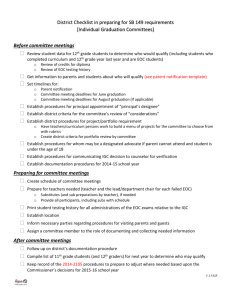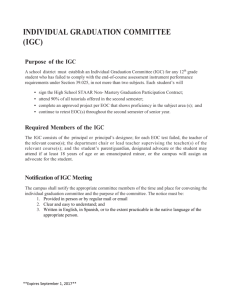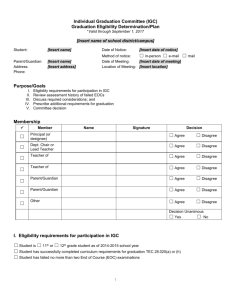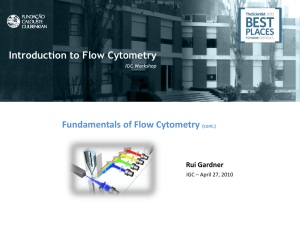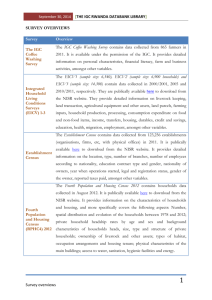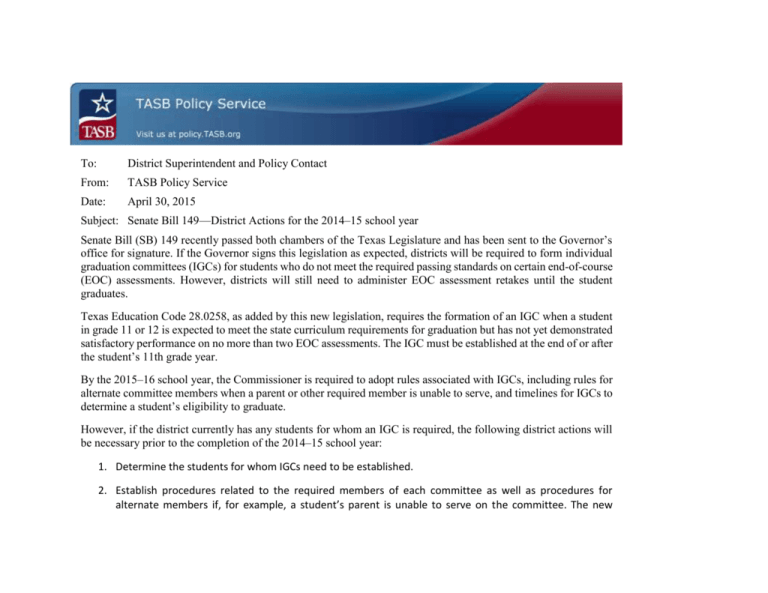
To:
District Superintendent and Policy Contact
From:
TASB Policy Service
Date:
April 30, 2015
Subject: Senate Bill 149—District Actions for the 2014–15 school year
Senate Bill (SB) 149 recently passed both chambers of the Texas Legislature and has been sent to the Governor’s
office for signature. If the Governor signs this legislation as expected, districts will be required to form individual
graduation committees (IGCs) for students who do not meet the required passing standards on certain end-of-course
(EOC) assessments. However, districts will still need to administer EOC assessment retakes until the student
graduates.
Texas Education Code 28.0258, as added by this new legislation, requires the formation of an IGC when a student
in grade 11 or 12 is expected to meet the state curriculum requirements for graduation but has not yet demonstrated
satisfactory performance on no more than two EOC assessments. The IGC must be established at the end of or after
the student’s 11th grade year.
By the 2015–16 school year, the Commissioner is required to adopt rules associated with IGCs, including rules for
alternate committee members when a parent or other required member is unable to serve, and timelines for IGCs to
determine a student’s eligibility to graduate.
However, if the district currently has any students for whom an IGC is required, the following district actions will
be necessary prior to the completion of the 2014–15 school year:
1. Determine the students for whom IGCs need to be established.
2. Establish procedures related to the required members of each committee as well as procedures for
alternate members if, for example, a student’s parent is unable to serve on the committee. The new
statute requires the following individuals to be on the IGC: the principal or principal’s designee; the teacher
of each course for which the student failed to demonstrate proficiency on an EOC assessment; the
department chair or lead teacher supervising each of the teachers; and the student’s parent, designated
advocate if the parent is unable to serve, or the student (at the student’s option) if the student is 18 years
of age or is an emancipated minor.
3. Determine the dates on which IGC meetings will be held for each eligible student. Districts are required to
make good faith efforts to timely notify parents, or the student when applicable, and must provide the
notice in person, by regular mail, or by e-mail. The notices for these meetings must be easily understood
and provided in English, Spanish, or, to the extent practicable, in the native language of the parent or
student. A translator, if available, must also be provided for these meetings if the parent or student is
unable to speak English.
4. Provide recommendations, if any, to your board about any additional academic information that an IGC
needs to consider when determining whether a student is qualified to graduate. SB 149 contains a lengthy
list of mandatory factors and also allows a school board to designate additional academic information that
the IGC must consider. If you will be recommending to your board that it adopt additional academic
information, timely action will be necessary through board resolution or other board action. Your TASB
policy consultant can assist with language should you wish to present recommendations to your board.
5. Establish a timeline for the IGCs to determine eligibility for graduation. A committee’s determination is
final and may not be appealed but must be unanimous.
The vast majority of the actions required of a school district as a result of this bill can be handled through the
establishment of administrative regulations. As mentioned above, the statute allows a local board to adopt additional
academic information that each individual graduation committee must consider. If your district’s FMH(LOCAL)
requires that students demonstrate satisfactory performance on all state assessments in order to participate in
commencement activities, changes—through a board resolution or policy revision—may be necessary to include
those students graduating based on the decision of an IGC. TASB Policy Service will continue to monitor the impact
of the legislation and subsequent Commissioner rules to determine if local policy recommendations will be made
through a numbered Update. Note that the statutory material will be added at Update 103, which will begin
production in late summer to incorporate this and other legislation as a result of the 84th Legislative Session.
If, however, your district would like assistance in developing language to take to your board for consideration and
adoption, please contact your policy consultant. You can read the enrolled bill
here: http://www.capitol.state.tx.us/tlodocs/84R/billtext/html/SB00149F.htm. Education Service Center (ESC)
Region 13 has also developed resources for districts regarding this legislation, which can be accessed at
http://www4.esc13.net/cc/senate-bill-149/. Keep in mind that the resources provided may be based on previous
versions of the bill but will be updated to reflect the final bill sent to the Governor. You are encouraged to contact
your own regional ESC for assistance.
This information is provided for educational purposes only to facilitate a general understanding of the law or other regulatory matter.
This information is neither an exhaustive treatment on the subject nor is this intended to substitute for the advice of an attorney or other
professional advisor. Consult with your attorney or professional advisor to apply these principles to specific fact situations.
If you need assistance accessing any of the policy resources available through your myTASB account or if you would like to be removed from this mailing
list, please contact Susan Acevedo at susan.acevedo@tasb.org.
P.O. Box 400 Austin, TX 78767
Copyright 2015 Texas Association of School Boards
All rights reserved.

